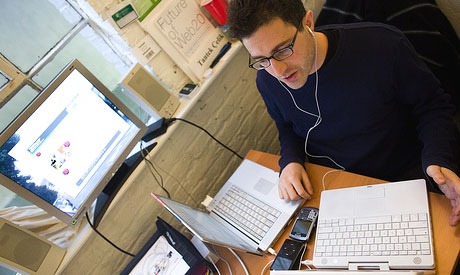
How do you feel when I say the word “multitasking”? Do you feel overwhelmed? Or do you proudly say that you’re a good multitasker? Does it stress you out? Or do you feel efficient?
As a health professional, I’m supposed to tell you that multitasking may be bad for your health. After all, your focus is usually poor when you try doing two or more things at once. Take, for example, the well known risks of driving and talking on a phone or text messaging.
In Traditional Chinese Medicine (TCM), even eating and working at the same time is discouraged. We believe that the digestive system (pancreas and spleen) is an important processing center-processing both foods and thoughts. If you are thinking intently about your next work project as you chew your food, your digestive energy is split.
I do believe that multitasking can be a four-letter word, but I seemingly can’t help being proud of my ability to multitask. The other day I was in a rush getting ready to go out. I was shaving my legs as I checked my emails on my iPad. I thought that was being pretty efficient, but I was still running late, so I grabbed my husband’s electric shaver (sshhh…don’t tell him) and had both my and his razors going at the same time, one in each hand.
I have also been known to brush my teeth as I select my clothes, combine a dog walk with my banking, have three to six books going at any given time, and make my business calls as I walk to work.
Everyone multitasks on some level, even if it’s just walking and chewing gum. But when is too much too much? How do you get your multitasking under control?
Yes, a woman’s brain may be better set up for multitasking than a man’s brain. Though it is yet unclear, some studies have shown women to have a larger corpus callosum, the connection between the left and the right hemispheres of the brain. If this is true, then it could explain why women seem more comfortable with multitasking than men.
I believe that some multitasking is good for me. Multitasking sometimes saves me time when time is tight. It also exercises my brain. But just because you can do something doesn’t mean you should all the time. Sometimes multitasking just allows my distracted energy to take over and I become unfocused and inefficient. Sometimes multitasking stresses me out!
Yoga is my break from an overactive mind. Yes, it’s true that in doing yoga I have to remember to work on my breath at the same time as I work on getting through the various moves. However, I can’t also remember then to think about what I want to do at work or the chores that need to get done. Reading a good fiction novel has always been another way that I can escape my multitasking brain. Sometimes reading works too well. I remember being a kid reading a Nancy Drew book in the back of my parents’ station wagon. I was snapped out of my intense focus on Nancy’s sleuthing prowess by my sister and my cousins laughing at me. I then noticed the reason for their laughter. Sticky, cold ice cream was melting its way down my arm and was dripping off my elbow because I had forgotten that I was holding an ice cream cone!
How do you feel about multitasking? How do you recognize when your own multitasking has become unhealthy? What do you do to give yourself a multitasking break?
Photo Credit: Thomas Hawk




